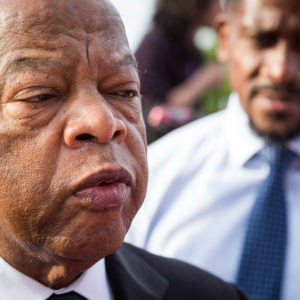The Founders designed their system of government to endure, to change — not swiftly, but through the labor of bringing a new idea through constitutional amendment.
With 61 percent of Americans in support of amending the Constitution to replace the Electoral College with a national popular vote, according to a poll published last month, the call for change has come.
The late civil rights leader John Lewis spoke in favor of the abolition of the Electoral College based on principle and his call for reform still resonates.
Lewis elucidated the principle of “one person, one vote” as he spoke from the steps of the Lincoln Memorial at the March on Washington over a half century ago.
The young Lewis, borrowing a phrase from the Zambian struggle for independence that he saw on a sign a few days before, put forth the call that would later become the basis for his Electoral College stance.
“‘One man, one vote’ is the African cry,” said Lewis, then the chairman of the Student Non-Violent Coordinating Committee (SNCC). “It is ours too. It must be ours.”
Yet decades later, after a summer of social upheaval, a reckoning on race, and Lewis’ passing, the call is still not “ours” as Americans cast their ballots for president in November. Five hundred and thirty eight individuals select the president in the Electoral College, not a “one person, one vote” system or a system based on direct political equality.
Understanding this history provides a link to our past and, potentially, a path forward.
“It Was on This Principle That we Suffered”
Covering almost the full gamut of Electoral College history in his new book Why Do We Still Have the Electoral College?, Harvard’s Alexander Keyssar shows the Electoral College was far from a meticulously crafted plan.
The Founders appointed a special committee at the Constitutional Convention to decide how to select a president, Keyssar explains. As the convention was adjourning, the Electoral College emerged. In the summer of 1787, it was the system that best preserved the compromises that had already been made at the convention about representation and power in Congress.
The 1969 effort to replace the Electoral College through a constitutional amendment for a national popular vote is especially pertinent. It shows how far the movement to replace the Electoral College through a constitutional amendment went, albeit in a different era.
The measure passed the House overwhelmingly (83 percent) with support from both political parties and representatives from small and large states, but failed in the less receptive Senate.
The reform effort came just four years after the political winds shifted with the passage of the 1965 Voting Rights Act, prompted, in part, by Lewis and those who marched with him in Alabama.
It was in between Lewis’ time with SNCC and his time in Congress that he expressed his view on the Electoral College most clearly.
“It is based on the fundamental principle of ‘one man, one vote’ that I view the direct election of the President,” Lewis told the Senate Subcommittee on Constitutional Amendments in 1979. “It was on this principle that we suffered abuse, attack, and even death in the struggle for the right to vote for minorities.”
Indiana Senator Birch Bayh, a Democrat, who chaired the subcommittee and led the 1969 effort, received Lewis’ testimony. The 1979 attempt fell short as well—defeated by a vote of 51-48—and no such measure has reached the floor of either chamber in the over four decades since.
“An Idea Whose Time has Not Only Come, but Is Long Overdue”
In that time, two presidents have been elected by winning the Electoral College while losing the popular vote.
Lewis, elected to Congress to represent Georgia in 1986, did not attend the presidential inauguration either time. It was not unlike Lewis to deeply question the legitimacy of an aspect of the nation he viewed as unjust.
He did it with fervor during his 1963 March speech. In the 21st century, as the Electoral College impedes democracy and the formation of a “more perfect Union,” Lewis’ vehement words still apply to both individuals and legislators alike.
“Get into this great revolution that is sweeping this nation,” Lewis said. “Get in and stay in the streets of every city, every village and hamlet of this nation until true freedom comes, until the revolution of 1776 is complete. We must get in this revolution and complete the revolution.”
The words of a more measured Lewis, testifying to Congress in 1979, still apply, too, and they are echoing in this era:
“Having won the long and difficult and dangerous struggle to win the right to vote, we cannot now accept the proposition that any one person’s vote can count more than another,” he told the subcommittee. “I respectfully submit that the direct popular election of the President and Vice President is an idea whose time has not only come, but is long overdue.”

